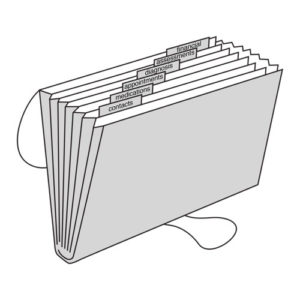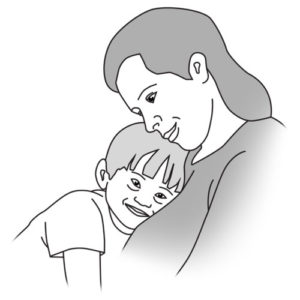https://complexcareathomeforchildren.com
![]()
https://complexcareathomeforchildren.com
You are probably already familiar with the chaos that is everyday when you are parenting a child with medical complexity. Organization can go a long way in helping you survive the chaos, that rollercoaster ride in the dark with both predictable and unpredictable ups and downs. Beyond the great relief of stress, we are convinced that organization will actually improve the safety and quality of your child’s care. Get started with the following:
Prepare travel bags in advance
General strategies for organization
Organize your paperwork
This is one of the very best investments you can make, worth every minute of preparation. If you are struggling to organize your paperwork, tell your child’s healthcare team and ask for help. As you know, when a child has multiple issues, with care provided by multiple professionals in multiple locations, and takes multiple medications… there is a lot of paperwork! Not getting organized means that papers are all over your house and hard (impossible) to quickly retrieve when you need them. If you are not organized, you may miss important appointments, waste time trying to find contact information, end up repeating the same information at every healthcare visit… the list goes on and on. On the other hand, getting your paperwork organized helps you:
Save time and energy by having important data readily available
Reduce the risk of errors that might arise from forgetting important information
Improve your ability to effectively advocate for your child by having key documents close at hand
Facilitate the care of your child, especially as your child transitions between care settings (eg, from home to the hospital)
Basically, getting organized with your child’s care can help you improve the SAFETY & EFFECTIVENESS of your child’s care and will REDUCE your daily stress. And, in the event that you are ill or absent, someone else can refer to these resources to help care for your child (eg, medication list, nutrition plan).
Here’s how you can get started:

Ask your healthcare team if they have ready-made templates to use in your care organizer. We are in the process of making bilingual PDF documents for easy download here. In the meantime, see The Center For Children with Special Needs website for either templates or ideas to get you started (not available in French).
Creating care plans
First of all, what is a care plan? A care plan is a set of instructions about a type of care that your child requires. It could be a summary document that lists all of your child’s needs or it can be specifically about one aspect of your child’s care (eg, treatment of seizures). A care plan should be made in collaboration with your child’s healthcare team and should be readily available to whoever might need to use it. Keep a copy of your child’s care plans in your care organizer (with some ready to go photocopies) and a photo of the care plan on your cellphone.
A care plan can be structure in many different ways. Many families like to keep a few versions of a care plan, that is:
“Green light” = Well day care plan (a description of usual care)
“Yellow light” = Sick day care plan (a description of how the care should be modified if the child is unwell)
“Red light” = Urgent care plan (suggestions on interventions in the case of an acute deterioration)
The urgent care plan should also be shared with your child’s closest emergency department and an up to date copy should be readily accessible in your child’s electronic health record. Templates of care plans can be found at several websites listed in Links of interest.
We are in the process of creating bilingual care plan templates in the form of printable fillable PDF documents. Print out a blank template and bring it to your next healthcare visit to work on developing care plans with your child’s healthcare team.
Prepare travel bags in advance

Basically this means being ready to leave your house, quickly, at any time and knowing that you have the various items that you need so that your child is safe and comfortable. Travel could mean an urgent trip to the hospital or a visit to the park – either way, you can rest easy knowing that you have the items that your child needs.
In each method of care, there is a section called “Required materials”, this tells you what items you will need to have on hand to do that particular care for your child. Talk to your child’s healthcare team and make a list of the items that you need to have on hand when you leave your home with your child. Think about the common issues that your child needs daily (eg, suctioning the mouth or airway) and ensure that you have the tools on hand to meet your child’s need wherever you are. Also consider emergency situations and discuss with your child healthcare team what items should be included in your travel bag (eg, Epi pen, hemostat clamp, a form of glucose for the child who has hypoglycemia, etc).
Once you have a complete list, make photocopies of it and keep one copy in the care organizer. Take a picture of the list and keep it on your cellphone.
Pack a bag with the needed equipment and keep it near the exit of your home. If you have more than one child with special needs, consider colour coding to keep the bags separate.
General strategies for organization
The general rule that 2 minutes in preparation saves 10 minutes in completing a task is especially true for parents looking after a child with complex needs. Once you have organized your paperwork and prepared a travel bag, then look for other ways to make the tasks that you do often run more efficiently. For example:
https://complexcareathomeforchildren.com/prepare-yourself/organizing-your-childs-care/
Disclaimer of Liability: By using this site, you acknowledge that you have read this disclaimer and agree to all of its terms. Before making any decisions regarding your health or if you have any medical questions, you should first consult a physician or qualified health care professional who can provide recommendations tailored to your specific needs. The information published on this site does not constitute a recommendation for treatment (preventive or curative), a prescription or a diagnosis and is not a substitute for the advice of a physician or qualified health professional.
As medical and technical knowledge is constantly evolving, the content of this site is made available for information purposes only. The contributors to this site, including clinical experts in pediatrics from across Quebec, make every effort to ensure that the information made available on this site is as accurate and reliable as possible, without guaranteeing the completeness or total absence of error of its content. The opinions contained in this site are the sole responsibility of the author(s) and are not binding on the contributors to this site. These opinions do not necessarily reflect the official viewpoint of the organizations mentioned, nor that of their directors or representatives. The contributors to this site cannot and will not assume any responsibility for the use of the published content or for the information otherwise accessible through any link or reference source. Any quotation or reference to a source external to this site is for informational purposes only and does not constitute an endorsement or claim, express or implied, regarding the content or validity of the information obtained from that external source.
All rights reserved: The contents of this site may not be reproduced or disseminated, in whole or in part, in any manner or by any means, electronic, mechanical, including photocopying, recording, or otherwise, or stored in a retrieval system of any kind that is not limited to private use, without the prior written permission of the copyright holder.
Copyright © 2024 Soins Complexes. Tous droits réservés/All rights reserved.